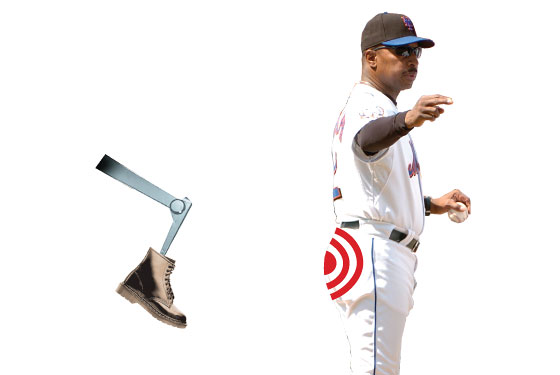
For sports fans, collapses are much more fun than victories. Last year’s historic Mets nosedive? “In terms of what we do,” WFAN heavyweight Mike Francesa recently said on HBO’s Costas Now, “that’s just golden.” And it’s why this year’s big Shea drama—will manager Willie Randolph get canned or won’t he?—has been splayed so gloriously across our city’s tabloids for the past two weeks. It’s just so much fun.
Unlike his football and basketball counterparts, a baseball coach doesn’t have much to do. “If you don’t win, you’re going to be fired,” Leo Durocher once said. “If you do win, you’ve only put off the day you’re going to be fired.” Research has shown that the manager’s main decisions—lineup, pitching-rotation order, bullpen usage—have minimal effect on wins and losses. A manager is only as good as his players. His real job is managing his persona. He needs to seem in control, he needs to ride the daily media tsunami, and he needs to keep millionaire athletes from taking over the clubhouse. These tasks don’t have a whole lot to do with winning games, but Joe Torre mastered them. Willie Randolph, with his out-loud musings about whether race had anything to do with his job security and his odd insistence that the team’s official network had it in for him, hasn’t.
And thank God. There’s something delightfully retro and charming about the hunt for Randolph’s hide. It’s been a while since New York’s had a good managerial deathwatch. Jim Fassel’s slog as Giants coach ended with a merciful execution in 2003, and since then, we’ve been mostly barren. Torre sat semi-comfortably atop the Yankees for more than a decade. We were denied this fun with Isiah Thomas, who finally petered out after three years in which it appeared he’d have to dump a body in the Hudson River to be fired. (And remember, he’s still employed by the team, even if he’s being paid to stay away from the players.) Back in the day, though, we watched the death spirals of Bobby Valentine and Rich Kotite and Dallas Green and so many others.
It’s why we’ll always be so fond of Billy Martin. He was the patron saint of managerial discord, cause for a whole city to discuss his comings and goings. When Steinbrenner was firing Billy every six months or so, New York sports were alive. Manager-in-crisis gives the tabloids a reason to live and the fans someone to blame for their daily agony. Our teams are extensions of ourselves, and when they fail, we fail. This, of course, will not do; someone must be punished. To hate your coach is to love your team. Sorry, Willie: It’s just your turn.
Have good intel? Send tips to intel@nymag.com.
